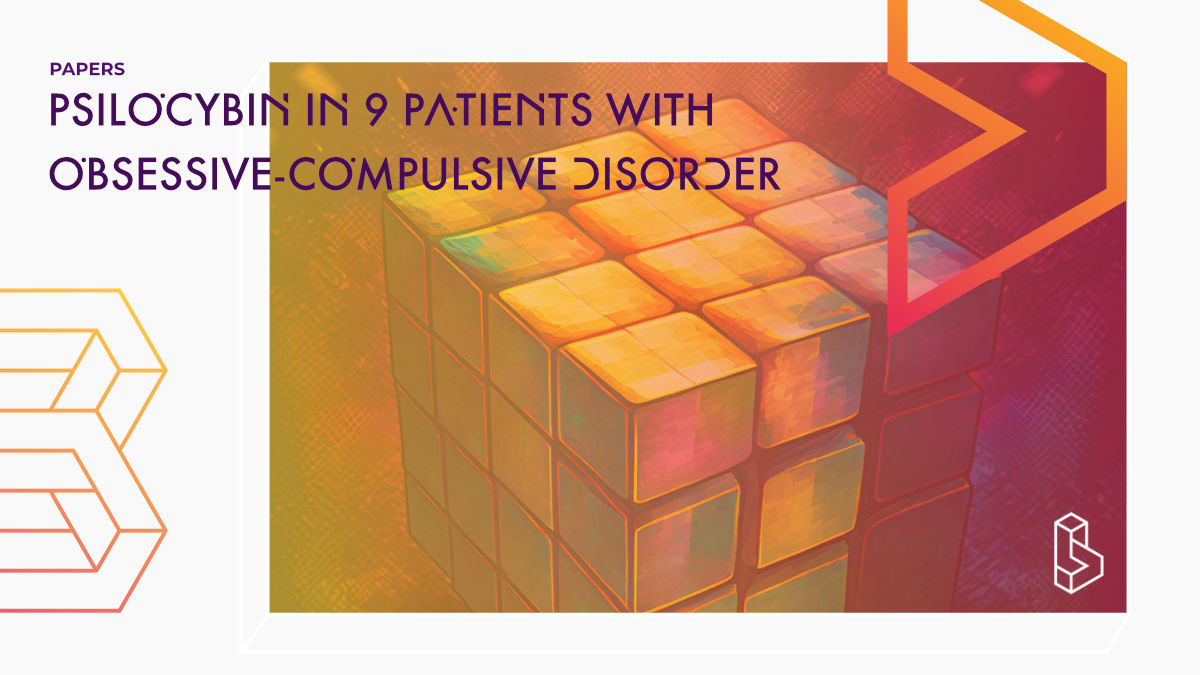This double-blind, placebo-controlled study (n=9) of psilocybin (up to 21mg/70kg) found no adverse effects and improvements in OCD symptoms. Immediate improvements on the Yale-Brown Obsessive Compulsive Scale (YBOCS) varied between 23-100% reductions. Positive results were also observed after the 24 hours reported in the study.
Abstract of Safety, Tolerability, and Efficacy of Psilocybin in 9 Patients With Obsessive-Compulsive Disorder
“Anecdotal reports suggest that psychedelic agents may relieve symptoms of obsessive-compulsive disorder (OCD). This modified double-blind study investigated the safety, tolerability, and clinical effects of psilocybin, a potent 5-HT(1A) and 5-HT(2A/2C) agonist, in patients with OCD. Nine subjects with DSM-IV-defined OCD and no other current major psychiatric disorder participated in up to 4 single-dose exposures to psilocybin in doses ranging from sub-hallucinogenic to frankly hallucinogenic. Low (100 microg/kg), medium (200 microg/kg), and high (300 microg/kg) doses were assigned in that order, and a very low dose (25 microg/kg) was inserted randomly and in a double-blind fashion at any time after the first dose. Testing days were separated by at least 1 week. Each session was conducted over an 8-hour period in a controlled environment in an outpatient clinic; subjects were then transferred to a psychiatric inpatient unit for overnight observation. The Yale-Brown Obsessive Compulsive Scale (YBOCS) and a visual analog scale measuring overall obsessive-compulsive symptom severity were administered at 0, 4, 8, and 24 hours post-ingestion. The Hallucinogen Rating Scale was administered at 8 hours, and vital signs were recorded at 0, 1, 4, 8, and 24 hours after ingestion. The study was conducted from November 2001 to November 2004. Nine subjects were administered a total of 29 psilocybin doses. One subject experienced transient hypertension without relation to anxiety or somatic symptoms, but no other significant adverse effects were observed. Marked decreases in OCD symptoms of variable degrees were observed in all subjects during 1 or more of the testing sessions (23%-100% decrease in YBOCS score). Repeated-measures analysis of variance for all YBOCS values revealed a significant main effect of time on Wilks lambda (F = 9.86, df = 3,3; p = .046), but no significant effect of dose (F = 2.25, df = 3,3; p = .261) or interaction of time and dose (F = 0.923, df = 9,45; p = .515). Improvement generally lasted past the 24-hour timepoint. In a controlled clinical environment, psilocybin was safely used in subjects with OCD and was associated with acute reductions in core OCD symptoms in several subjects.”
Authors: Francisco A. Moreno, Christopher B. Wiegand, E. Keolani Taitano & Pedro L. Delgado
Summary of Safety, Tolerability, and Efficacy of Psilocybin in 9 Patients With Obsessive-Compulsive Disorder
OCD is the fourth most common psychiatric diagnosis with a high disease burden. Many patients with OCD delay or altogether avoid pursuing care.
SRIs are among the most effective pharmacologic treatments for OCD, although they reduce symptoms by only 30% to 50%. Some SRI-treated patients who receive the 5-HT2 antagonist metergoline experience a resurgence of OCD symptoms.
OCD is a chronic and debilitating condition with a lifetime prevalence. Although treatment with SRIs is extensive, the remission rates are minimal, and many patients considered responders have residual symptoms.
Find this paper
Safety, Tolerability, and Efficacy of Psilocybin in 9 Patients With Obsessive-Compulsive Disorder
https://doi.org/10.4088/JCP.v67n1110
Open Access | Google Scholar | Backup | 🕊
Cite this paper (APA)
Moreno, F. A., Wiegand, C. B., Taitano, E. K., & Delgado, P. L. (2006). Safety, tolerability, and efficacy of psilocybin in 9 patients with obsessive-compulsive disorder. Journal of Clinical Psychiatry, 67(11), 1735-1740.
Study details
Compounds studied
Psilocybin
Topics studied
Obsessive-Compulsive Disorder
Study characteristics
Original
Placebo-Controlled
Active Placebo
Double-Blind
Within-Subject
Participants
9
Humans
Authors
Authors associated with this publication with profiles on Blossom
Francisco MorenoFrancisco A. Moreno, M.D. is Professor of Psychiatry and Associate Vice President at the University of Arizona
Institutes
Institutes associated with this publication
University of ArizonaDr Franscio Moreno at the University of Arizona has been exploring the potential of psychedelic's to treat OCD.
Compound Details
The psychedelics given at which dose and how many times
Psilocybin 7 - 21mg | 4x

